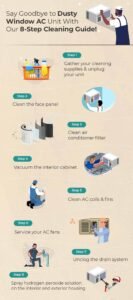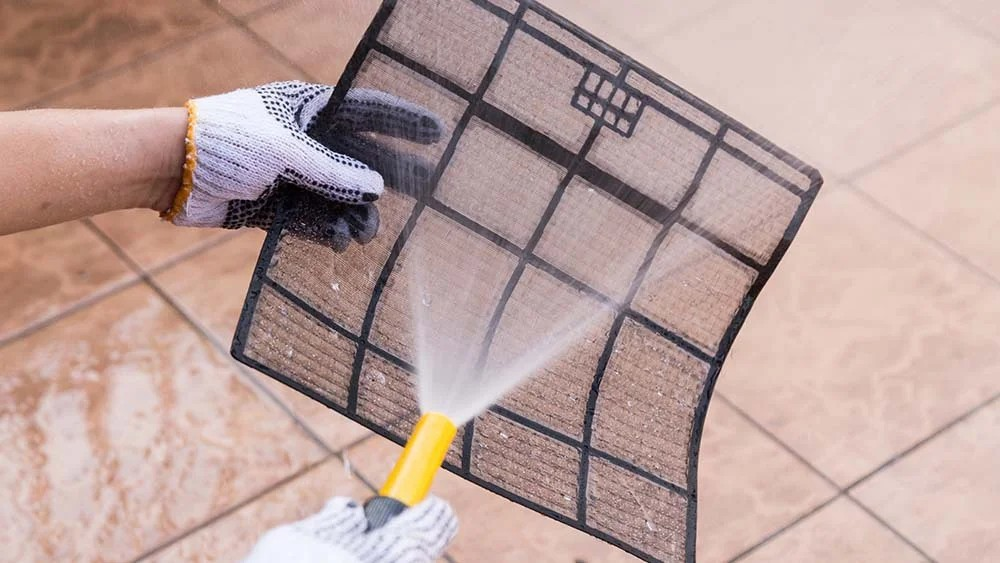A Step-by-Step Guide to Servicing Your Air Conditioner Yourself can help maintain its efficiency and extend its lifespan. Here’s a step-by-step guide to performing basic maintenance tasks on your AC unit:
Tools and Materials Needed
- Screwdrivers (Phillips and flathead)
- Fin comb (for straightening bent fins)
- Soft brush
- Vacuum cleaner with a brush attachment
- Garden hose

- Coil cleaner
- Replacement air filter (if necessary)
- Cloths or rags
- Gloves and safety glasses
Turn Off the Power
Before starting any maintenance, ensure the power to the AC unit is turned off to avoid any risk of electrical shock.
- Locate the shut-off box near the outdoor unit and turn it off.
- Alternatively, switch off the breaker in the main electrical panel.
Clean or Replace the Air Filter
- Locate the filter, which is usually behind the return air grille, inside the blower compartment, or in a slot in the ductwork.
- Remove the filter and inspect it. If it’s reusable, clean it with a vacuum or rinse it with water. Allow it to dry completely before reinstalling.
- If the filter is disposable, replace it with a new one.
Clean the Condenser Coils
- Remove debris from around the outdoor unit using a vacuum or a soft brush.
- Unscrew and remove the protective grille or cover from the condenser unit.
- Use a soft brush or vacuum to remove dirt and debris from the coils.
- Spray the coils with a coil cleaner and allow it to sit for about 10-15 minutes.
- Rinse the coils with a garden hose, being careful not to damage the fins.
Straighten Bent Coil Fins
- Use a fin comb to gently straighten any bent fins on the condenser coils. Be careful not to damage the fins.
Clean the Evaporator Coils
- Locate the evaporator coils, which are usually inside the indoor unit.
- If the coils are dirty, use a soft brush to remove dust and debris.
- Spray the coils with a no-rinse coil cleaner, following the manufacturer’s instructions.
Clear the Condensate Drain
- Locate the condensate drain line, usually a PVC pipe near the indoor unit.
- Use a wet/dry vacuum to clear any clogs in the drain line.
- Pour a mixture of equal parts water and white vinegar into the drain to prevent future clogs.
Inspect and Clean the Blower Fan
- Open the access panel to the blower compartment.
- Use a vacuum or brush to remove dust and debris from the blower fan blades.
- Check the blower motor for any signs of wear or damage.
Check and Tighten Electrical Connections
- Inspect all electrical connections in both the indoor and outdoor units.
- Tighten any loose connections using a screwdriver.
Reassemble and Test the Unit
- Reattach the condenser unit cover and secure it with screws.
- Turn the power back on to the AC unit.
- Set the thermostat to a desired temperature and let the unit run for a few minutes.
- Check for proper airflow and ensure the unit is cooling effectively.
Regular Maintenance Schedule
- Repeat the above steps at least once a year, preferably before the start of the cooling season.
- For heavily used systems, consider performing maintenance every six months.
Safety Tips
- Always turn off the power before performing any maintenance.
- Wear gloves and safety glasses to protect yourself from debris and cleaning chemicals.
- Be gentle when handling delicate components like fins and coils.
- If you’re unsure about any part of the process, consult the manufacturer’s manual or seek help from a professional.
Regular maintenance of your AC unit can help ensure it runs efficiently and effectively, saving you money on energy bills and avoiding costly repairs in the future.
Looking to install a commercial HVAC System or Duct work in your Business Area?
Contact Vipul Ac to learn about our HVAC Service
Call +91 9825636606 Today.

